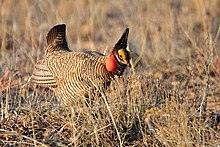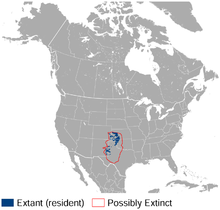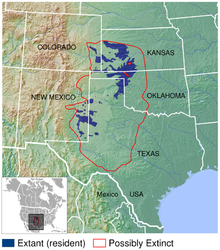Lesser prairie-chicken
| Lesser prairie chicken | |
|---|---|
 |
|
| A lesser prairie chicken in New Mexico | |
| Scientific classification | |
| Kingdom: | Animalia |
| Phylum: | Chordata |
| Class: | Aves |
| Order: | Galliformes |
| Family: | Phasianidae |
| Genus: | Tympanuchus |
| Species: | T. pallidicinctus |
| Binomial name | |
|
Tympanuchus pallidicinctus (Ridgway, 1873) |
|
 |
|
| Lesser prairie chicken range | |
 |
|
| Enlarged distribution map. | |
| Synonyms | |
|
Tympanuchus cupido pallidicinctus |
|
Tympanuchus cupido pallidicinctus
The lesser prairie chicken (Tympanuchus pallidicinctus), a species in the grouse family, is slightly smaller and paler than its near relative the greater prairie chicken. About half of its current population lives in western Kansas, with the other half in the sandhills and prairies of western Oklahoma, the Texas Panhandle including the Llano Estacado, eastern New Mexico, and southeastern Colorado.
Like its larger relative, it is known for its lekking behavior.
Considered "vulnerable" by the IUCN due to its restricted and patchy range, it is vulnerable to habitat destruction. There is evidence suggesting that global warming may have a particularly detrimental influence by greatly reducing the size of the sagebrush ecosystem.Subfossil remains are known, e.g., from Rocky Arroyo in the Guadalupe Mountains, outside the species' current range but where more habitat existed in the less humid conditions in the outgoing last ice age. Range contraction apparently took place no later than about 8000 BC.
The United States Department of the Interior proposed creating a Lesser Prairie Chicken Preserve as a National Monument, but action was never taken action on the proposal. On March 27, 2014, the lesser prairie chicken was listed as threatened (T) under the Endangered Species Act but the listing was vacated in 2015 following a legal challenge and the bird's status remains uncertain.
...
Wikipedia

